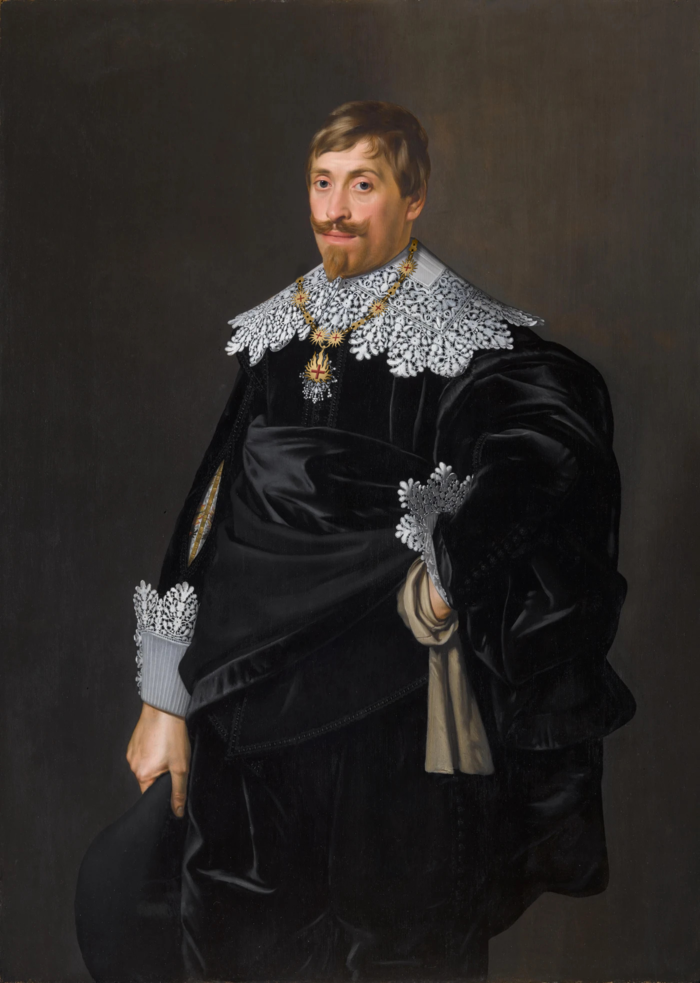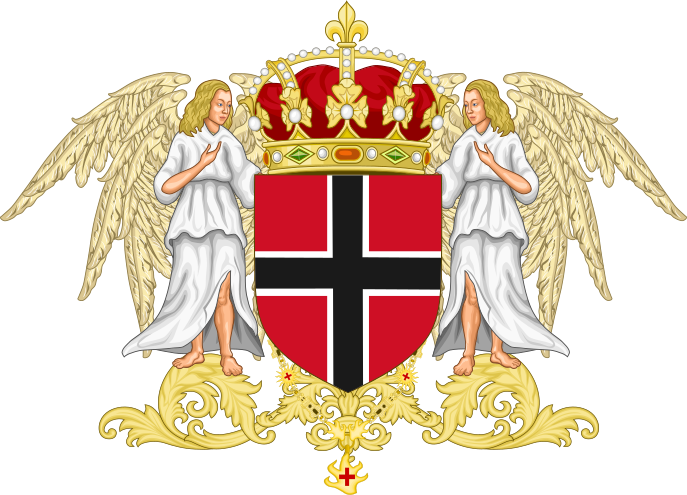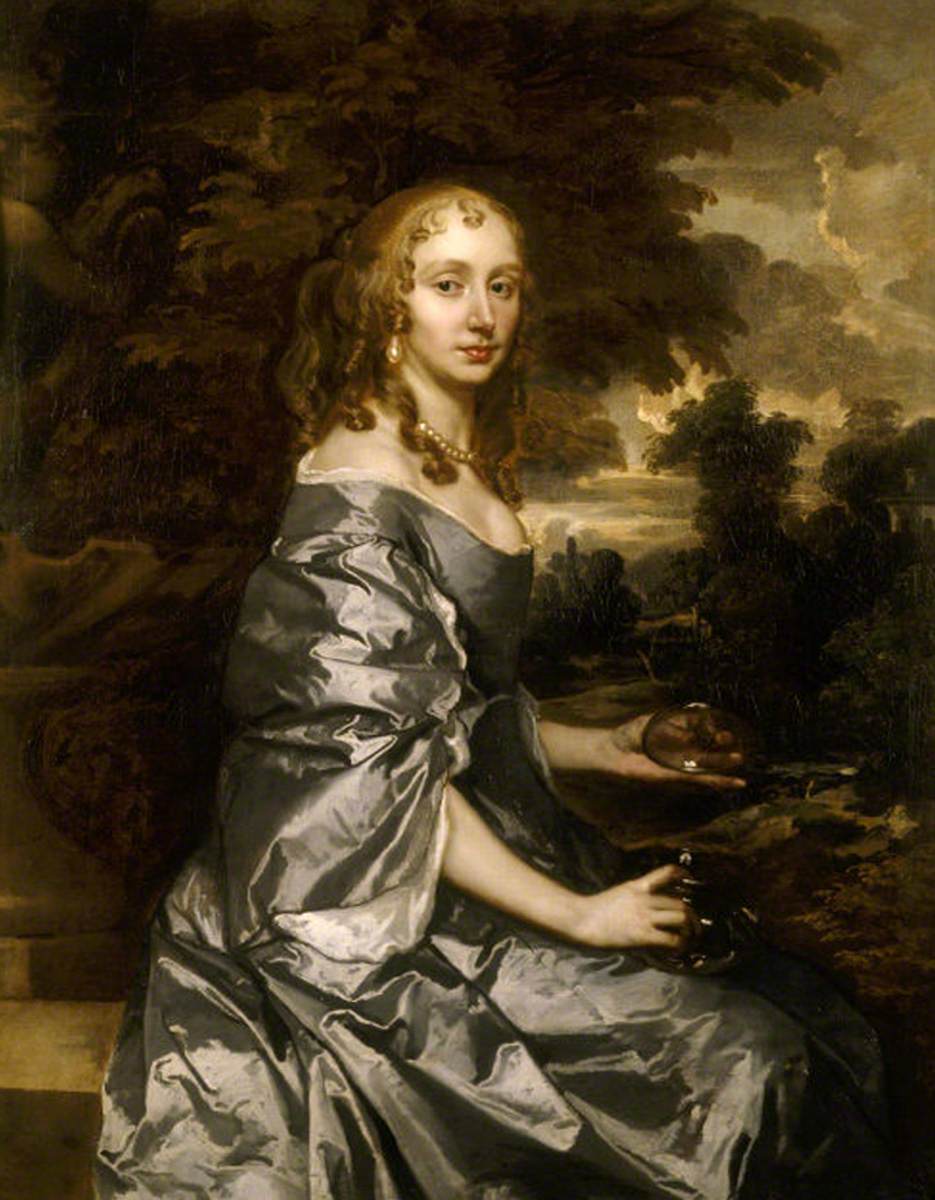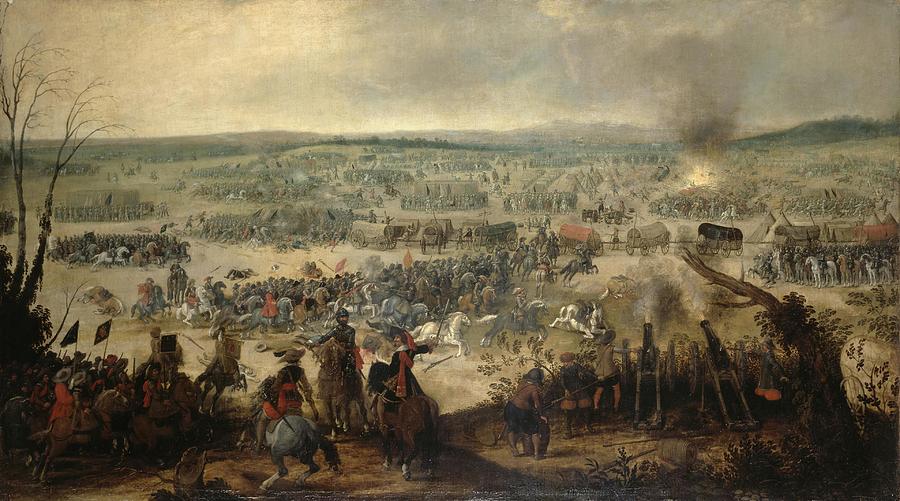Adonis II of Rafia
Early Life
Adonis was born at the Paleis Van de Lange in Albillan in 1404 as the second son of Maurice IV of Rafia and Anna Katerina of Galanya, the first, prince-royal Jan, having died hours after his birth the previous year. He was described in his young age by royal chroniclers as "a joyous child, possessing great agility and intellect, often used to his advantage in detriment of the serving women when it is [their] intention to bathe, clothe or otherwise restrict the prince in one single position for a long period". In 1420, after great insistence from his father to Arthur of Lagrave, younger brother of King Frederick IV, he was betrothed to Martha of Lagrave. They were presented after the agreement on their marriage between their parents, the exact terms of which continued to prove themselves a source of fiery debate, some of it even pushing the princess' father close to calling off the wedding. He was dissuaded by his own daughter, who fell in love with the rafian prince-royal nearly immediately after meeting him. He seemed to be indifferent to her at first, but soon enough he too fell madly for the young princess, discribing her to his cousin, Roderick of Rafia-Wendhovel, as "the most fascinating girl he had ever met". After nearly a year of court, they were married in the Mother Cathedral of Saint Basil the Divine in Albillan.Reign
His father died at the age of 42, which made the young Adonis take the throne early, at 18. Many believed him to be unready, and with the reign of his father having been seen as a failure due to the secession and subsequent independence of Westport, his popularity among the populace at the time of his coronation was not high, though it is generally agreed he was regarded as smarter than his father. His wife, now styled Queen-Consort, was only one year younger than Adonis himself (a rare age difference in royal marriages, usually much more significant) and so bore his first child in 1424, when the king was 20 years old and she 19. This child was baptized Robert and given the title of Prince-Royal of Rafia as heir apparent to the throne, but he died at 4 years of age under unknown circumstances. The death of the prince deeply impacted the young queen, who was known to have taken great affection for her child, and as a result she and the king would not attempt to concieve another heir for nearly two years, much to the disapproval of the courts-general, who feared for the stability of the kingdom with no heir to take up the throne in case Adonis died young as his father had before him. In 1430, Princess Sofie was born and the following year, a new male heir, Prince-Royal Francis. In 1433, the queen bore twins, Prince Denis and Princess Louise. Since early Adonis showed himself to be a great preponent of rafian expansion into the New World discovered by imperial explorer Vico di Ravello in 1389. Many in Rafia were against the notion of expansion, claiming it to be a fruitless effort with little returns for the kingdom, but most soon changed their minds. With the establishment of the fortress of Sint Anna in the New World (1444), the imports of crimsonwood, new fruits and animals as well as the possibility for new trade routes with Anséis brought great wealth to the pockets of the rafian monarchy, of which the nobility and bourgousie, naturally, claimed a large slice. This restored the faith of the people, now living comfortably comparatively to other third estates across the continent, in the crown. He was quick to forge diplomatic ties with the Empire of Alcay, a mostly isolationist southern realm the state religion of which, like Rafia's, was Reformist Catanianism, albeit under the Church of Alcay, which operated with significant difference to the Church of Rafia. This helped bring the reformist faiths closer together, which would later prove useful in the Gunpowder War (1454-1462), wherein the military partnership of both nations was crucial in the defeat of the numerically superior August Empire. He became great friends of the Alcaian emperor, Alphonse IX, whom he wrote to and recieved correspondence from frequently for the rest of his life. Adonis visited Alcay in 1437 and once again in 1441, while Alphonse visited Rafia only once, in 1439. This friendship was evident until even after Adonis' death, when the Alcaian emperor wrote:I have not often in my many years been saddened as much by the loss of a friend, much less a king, for I tend to turn a colder cheek to that bunch, lest they push on me and my people their interests and conditions. I did not know him many times as the King of the Rafians, but as my friend Adonis, who I much cherished. [...] May God, in His infinite wisdoms, keep him ever close to His breast.
Efforts against slavery
Adonis was known to despise slavery. Once (c. 1435?), on occasion of the Lagravian ambassador's visit to the royal palace in Albillan, this latter is reported to have commented on the beauty of the edifice's architectural style. Adonis, making use of a traditional Rafian proverb, is said to have retorted thusly:The most fragrant lavender, sir, blows in bad fields.The Paleis Van de Lange had been renovated on the orders of his father, king Maurice IV, beginning in the late 14th century. These renovations infamously employed many enslaved workers (mainly orcish), loaned by slave-driving companies for free labour in service of the king in exchange for commercial privileges and tariff breaks within the Rafian slave markets. Adonis witnessed the latter half of these renovations as a child, and the sight of orcish slave labour is likely to have stuck with him as a wrong to be righted in Rafian society, a train of thought he carried into his relationship with the practice of slavery as a monarch. In 1445, Adonis signed a royal edict titled "A Royal Adress of the situation concerning the races of orcs, elves and halflings in Rafia" (originally titled "Een Koninklijke Aanſpraak betreffende de ſituatie van orks, elfen en halflingen in Raphia"), by which freemen of the three races, who up to this point had less rights and could only exercise their limited freedom in certain places, were granted unconditional equality in legal rights compared to humans. This move faced significant backlash from many in the Upper House of the Courts-General, who even wanted to go as far as to veto the king's decision (something which they did not have the power to do, as the right to amend issues of civil liberty is a power bestowed only on the king, as rector of his subjects), as many remunerated servants of the high nobility were free elven stewards and maids, which were in fashion as housekeepers in lieu of orcish slaves, considered better suited to manual labour harvesting fields or building structures around the property. As there are few elven slaves yet, the bulk of the slave population being composed of orcs, equality between humans and elven housekeepers meant a necessary increase of many of the nobility's servants' salaries, which were higher for humans before than freemen. Years later, in 1457, Adonis chose to pass another edict regarding slavery, this time in the form of regulatory bindings and tariff raises on slave-driving companies such as the Casa de Bon-Vyel, the Rafiaans Slavenbedrijf and the Sunryse Companie of Westport. Tariffs on slave imports for any Rafian market saw an increase of 20%, taxes on Rafian slaving companies were increased by 15% and the price for the purchase of Rafian-born or traded slaves by any foreign trading company was, by law, increased threefold. This saw a minor decrease of slave trading activity in Rafian ports and despite this, a slight increase of profits made by the crown from taxes on slave drivers. It is not known if the king ever wanted to abolish slavery outright (or if he even ever thought it possible at all), but such a thing did not seem to be in his plans.
The Gunpowder War
In 1448, the August Emperor Aquilius I signed the "Mulled Wine Issue" which banned foreign countries outside the Empire from importing pargentais wine (began as only mulled wine, was amended a week later to include all wine varieties). This greatly affected the economy of the states of Pargentie, especially the Duchy of Montauban's, the ducal house and advisors of which began plotting against the emperor, to which Rafia and her royal house were invited to aid. As a political maneuvre, Adonis married his nephew, Jan-Martien, duke of Durgen, to the grand-niece of the duke of Montauban, Anne-Helizabéthe du Haute-Bellegarde, as a means of forming a discreet political alliance "should Montauban be unable to assert it's supposed independence from imperial rule peacefully". This plan was unsuccessful, as emperor Aquilius was notified of this, seemingly drawing his ire, through which he sent six regiments of mixed mercenary and imperial guard men to sack and raze villages in southern Montauban in retaliation. This event became known as the "Week of the Black Bonfires", which is generally considered to have been the starting point of the Montaubanian Rebellion. After this event, Adonis was called on by Archebaud (now sworn in as King Archebaud III of Pargentie, a throne he had a claim on through his great-great-grandfather, the famed Theobalt of Pargentie) to defend their alliance, as expected, and so the Rafian Army began to mobilize for combat. The first engagement of the war between rafian and imperial forces happened at Ide-De-La-Manche, in the region of the Manche, in the north of Upper Bellegarde, resulting in an unlikely rafian victory. The king wrote a letter of congratulations to the victorious soldiers, stating:God only knows of the true extent of my pride for the great soldier-heroes of Ide-De-La-Manche. (...) Know all ye men of bravery that your king acknowledges you, salutes you, and owes you a great debt, now and forever.Although it is customary for a king to accompany or lead his men into at least one battle, Adonis could not fulfill this in the early months of the war because of his rapidly aggravating gout, which caused him problems in mobility as well as general well-being. This was mostly understood by the soldiers, whom were in fact mostly sympathetic to the king in the face of his ailment. He did often frequent military camps in Rafia and northern Pargentie to support the morale of his men and did all he could to ensure the army was as well-stocked, well-fed and well-armed as possible at all times. Despite his gout, which in it's later years prevented him from walking or riding on horseback without feeling tremendous pain, which meant he had to be carried around by his aides on a specially made liftable chair, in a period of lesser pains in the autumn of 1457 he made sure to accompany his men to as close to the field of battle as was safe for him and his entourage to do so and to address them before some few major battles mostly resulting in victory through stupendously high morale, which won him great respect among the soldiers and his sobriquet "The Glorious". In the summer of 1458, while in Lower Pargentie accompanying the army, the king began to suffer from repeated instances of sharp toraxic pain, which the royal physicians on the site theorized could be due to the heat and dryness of the southern montaubanian climate, so he was recommended to return to Rafia as soon as possible, which he did the following month. From then for the rest of his lifetime he was informed of matters on the war by his advisors and in writing by his marshals and other officers on the field in Pargentie, especially by the Duke of Riesburg (who served the king as Constable of Rafia). Some of his meetings with returning officers were held at their respective holdings, on the wishes of the king to still travel around the country despite his poor health. A letter written by the king to Riesburg is often quoted on this matter, reading:
(...) I would rather be pained by my duties as king than be comforted by the lack of them while having accomplished nothing.
Death
Adonis succumbed to a possible stroke brought on by his advanced gout in 1459, at only 55 years of age. He was on one of these visits to Constable Riesburg, to hear his reports on the war at the time of his death. His last words are reported to have been "Routhe, the water." (speaking to his aide Routhe Van Wendel to put a nearby glass of water closer to his reach, given his limited, almost completely deteriorated mobility), followed by some incomprehensible words moments before his death. He was known to drink water to distract himself from surges of great pain brought on by the disease, which suggests he may have felt sharp pains before he perished. When informed of his passing, queen Martha's joyful spirit was broken. Her aides recounted she fell into a state of very deep melancholy, then promptly dying herself two months later, presumably of heartbreak. One of her aides, Agnetha, wrote the following in a journal she kept in secret:My entire life I have dedicated to the service of His and Her Royal Majesties and have in the lady queen not only a kindly, happy mistress but a great friend and confidante as well. (...) Never before hath I seen her in this state of tragedy. I worry sick that Her Majesty shall kill herself with her own anguish. Lord knows it hurts me so, to see her in these horrible circumstances.At the time of her death, the queen was presumed to be sleeping, yet in the morning her body was found lifeless, on her bedside table was a sheet of paper and a quill, on and with which the queen had written a rafian-type sonnet taken from The Rose of Hogeberg, or The Rafian Tragedy, a classic theater play by renowned rafian playwright Jan Van De Hoorn, one of Adonis' favourite plays. The sonnet is an excerpt from the penultimate scene wherein the main character, Karolus, monologues about the death of his lover, Bethilda, at the hands of Black Tribes assassins, and explains how instead of willing for revenge, he wishes more than anything only to have her again, and, after considering and rejecting suicide, he dies of grief, pacified by the idea of meeting his loved one in the afterlife. It read:
The king was buried at the Convent of Saint Jules of Albeheuvel in Albillan on the 1st of Consummatio of 1460. That day saw the longest funerary cortége in Rafian history, with at least 4500 people present at some point of the march from the Royal Mortuary by the royal palace to the convent on the other side of the city. After her own death, the queen was buried beside him and her tomb's cover was sculpted with her holding a rose, as a reference to the play she quoted before her passing.Thou art gone, I sit in shade,
Gone ist all of my life's plan
For what serve the hearts of man
If not to love were they made?
As I grasp the daemon's blade
Over mine own for to scan
Misery hath but began.
Oh, but God surely knows me!
He hath put me to the test,
for a blind eye wants to see,
and a mute tongue to protest,
like a gull flown out to sea,
bearing courage in her breast,
My one love, I promise thee,
That beside you I shall rest.
Legacy
Adonis made many changes to the rafian nation that carried on after his death. His reforms concerning civil rights for non-humans led many de-segregated individuals to flock to Rafia for work, among them the orcish scholar Darok Garul (né Darroka-ol-Garula) and many herallan halflings fleeing from the war waged between the Empire and galanian and gaelban rebels close to their border. The colonies he funded in the New World became thriving trading ports in time, bringing great material and tariff wealth to the kingdom. His son and successor on the rafian throne, Francis, picked up where he left off in army matters, making groundbreaking reforms to the Rafian Royal Army, making it one of the fiercest fighting forces on the continent and in so doing, going on to win the Gunpowder War against the numerically far superior Empire with help from the Alchaïan allies his father befriended and allied himself to. He is remembered by historians as "a kind and poiseful monarch, whose physical disabilities did not rob him of his talent for diplomacy".Titles and styles
In all his royal issues, Adonis was styled "By the Grace of God and Saint Basil, Adonis the Second, King of Rafia, Duke of Albillan, Marquess of the Rijn and Lord-Protector of Witteland and Frijesbeck" in full and "Adonis, King of Rafia" for short.
King of Rafia
Reign: 14 Sarc. 1422- 6 Prov. 1459 Coronation: 15 Plan. 1422 Predecessor: Maurice IV Successor: FrancisPaleis Van de Lange, Albillan, Rafia
Died: 6 Prov. 1459 (aged 55)Rivierhuis, Riesburg-op-Prau, Rafia
Burial: 1 Cons. 1460Albeheuvel
Spouse: Martha of Lagrave (m. 1420) Issue:Robert, Prince-Royal of Rafia
Sofie, Princess of Westport
Denis of Rafia
Louise, Duchess of Bas Bellegarde
Names:Adonis Mauritz Van de Lange
House: Van de Lange Father: Maurice IV of Rafia Mother: Anna Katerina of Galanya Signature:Remove these ads. Join the Worldbuilders Guild














Hi there! You may not know me, but I am the sponsor of the Great Leader of Their People Summer Camp Prompt this year! Since you wrote this article, I would like to know, would you mind me reading it aloud on my Twitch channel this week? I have a lot to get through so it helps to do it live while people watch. I've scheduled to go live at 8am and 8pm Eastern Time every weekday. If you join and comment, I can go over your article right then and there! If you'd like to coordinate a specific date, let me know. If you aren't able to make it (or don't want to be present live), you can also always watch streams after the fact on my YouTube channel BUT, if the answer is NO because you'd rather I not, it's okay! Not agreeing to be streamed definitely does not put you at any disadvantage for winning in my eyes. Please respond swiftly by replying here (make sure to click REPLY under my comment or I won't be notified), message me on my World Anvil profile page, Discord, or anywhere else you find me online. Thanks again! Whatever you choose, God bless and much success! <3
Check the latest in the wonderful world of WILLOWISP...
Find out what I'm up to...
Support my creative efforts <3
Hello Wordigirl! I've got to begin by apologizing profusely that I am so terribly late for this, but so much got between me and my WA page in the last summer months that I just could not make it here very often, unfortunately. :( This leaves me especially bothered because even though I did apply for worldbuilding summer camp, I couldn't see it through to the end and would have loved for you to have read the article on your Twitch channel! Was this specifically related to the summer camp or do you still read articles on your channel? If so, I would love to be featured, if you'd still like to include this article. Either way, I apologize once again for my colossal delay in responding to you. Thank you for your invite regardless, and God bless! <3
no worries at all! I read it off stream and left a review below. I can still do some things but right now is NaNoWriMo, so if I stream, it'll most likely be writing sprints or something. Still, thank you for your reply! <3
Check the latest in the wonderful world of WILLOWISP...
Find out what I'm up to...
Support my creative efforts <3